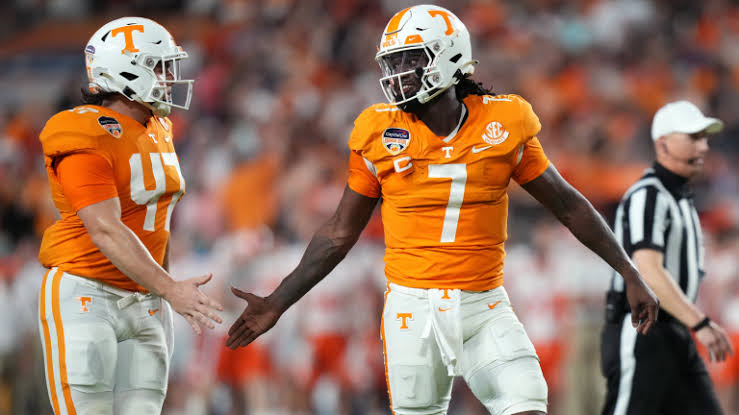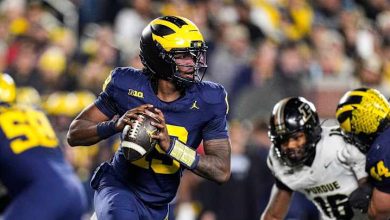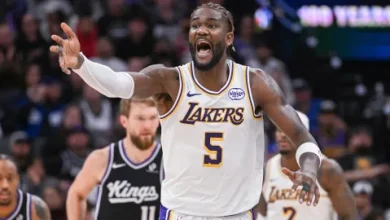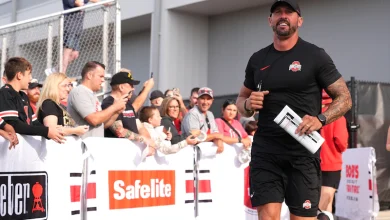HORRIBLE: TENNESSEE VOLS RECEIVER WAS HEAVILY INVOLVED IN AN…..

Instead, a series of poor decisions dating back to the Volunteers’ heyday during the late 1990s and early 2000s contributed to the current state of the program. The result is that a team which was once one of the nation’s strongest is 33-41 since 2008 with one winning season and four head coaches.
While there were minor NCAA issues that landed the Vols on probation, the program’s fall occurred largely without the aid of crippling sanctions. Instead, UT has suffered thanks to multiple self-inflicted internal failures, most of which happened under former athletic director Mike Hamilton’s watch.
From the abrupt end of legendary coach Phillip Fulmer, to the failed tenures of Lane Kiffin and Derek Dooley, to the athletic department’s financial blunders, many factors have contributed to Tennessee’s fall from grace.
Said Govols247 writer Wes Rucker, who has covered the football program on and off for the better part of 12 years:
“I always thought something like this was possible, because history shows time and time again that no program is immune to lulls like this. I’m not sure I would have envisioned it lasting this long.”
“I won’t say [the athletic department] was broken beyond repair, but it was a shell of its former self before Dave Hart got there, and it didn’t have anything resembling an identity. It was financially and psychologically in a bad place. That’s what happens when you enter a lull during one of the strongest periods in SEC football history…”
Al Messerschmidt/Getty Images
With the hiring of Hart as athletic director in 2011 and football coach Butch Jones in December of last year, UT hopes it’s on its way up, but that hasn’t happened yet.
Tennessee suffered its fourth straight losing season in 2013 for the first time since 1906, serving as a nasty reminder that recovery won’t happen overnight.
Jayson Swain, a sports talk host on Knoxville’s 1180 AM Tennessee Sports Radio, is a former Vols wide receiver who has been around the program since his freshman year in 2003. He has witnessed the steady tearing down of the program:
“It’s guys in suits making all the money not knowing what they’re doing,” Swain said. “It’s Tennessee messing up Tennessee. It’s got nothing to do with Florida or Alabama.
“It’s one word: complacency. Everybody can look at Coach Fulmer, but it’s not just him. It’s the boosters, athletic department, administration, coaches, everybody got comfortable. Everyone was used to success, and they would be there for a long, long, long time, and I think when you have people who work at one place for a long time, they get comfortable.”
Tennessee simply lost its edge.
FULMER’S FALL
No matter how polarizing his career—and especially his final few seasons—were in Knoxville, nobody can dispute that Fulmer had a historic run. His 152-52 record speaks for itself.
But few would dispute the argument that the program’s slide began with him at the helm.
Coming off a 45-5 stretch from 1995-98 that culminated with a national championship, UT was the class of the country. But offensive coordinator David Cutcliffe left for the head coaching job at Ole Miss in ’98, and the dominoes began to fall.
With the trio of Fulmer, Cutcliffe and defensive coordinator John Chavis, the Vols were dominant. Without Cut, chinks in the armor appeared.
The Vols would have played for another national championship in 2001, but LSU upset them in the SEC Championship Game, unceremoniously ending Tennessee’s time atop the conference. Fulmer’s grip on the program never quite tightened after that, giving way to uninspired play and a rash of off-the-field player transgressions.
Then in 2005, the Vols were ranked third in the preseason poll by The Associated Press. UT appeared poised to go with senior Rick Clausen at quarterback after he supposedly beat out rising sophomore Erik Ainge for the starting job in the preseason.
Instead, Fulmer alienated his team, Swain said, by going with the more talented Ainge over Clausen. UT went 5-6 and failed to make a bowl. Swain saw it as one of the first real outward signs that things had taken a turn:
“There is no way we should have played for one national championship between 1998 and 2007. There were too many NFL players,” Swain said. “I can’t pinpoint exactly what happened or when it happened, but there were a lot of things that just wasn’t right by then.”
Tennessee rebounded to go 9-4 in 2006 and 10-4 in ’07, but a 5-7 campaign in 2008 after Fulmer made the disastrous hire of offensive coordinator Dave Clawson was the final straw.
Hamilton let Fulmer go, and the team has been trying to reclaim some of that glory ever since.
Bud Ford was a part of 46 years in the UT athletic department from 1966-2012. The former associate athletic director for media relations witnessed the Fulmer fallout firsthand and still has strong feelings about where things went wrong:
“I felt like the whole dynamic of the program changed when Phillip Fulmer was let go as head football coach. I’m not going to say I agree or disagree with it. It just affected the whole program greatly. I thought at the time it was not time to change the football program. With that being said, everything that happened from that point forward has gone downhill.”
FALLOUT FROM FULMER
Regardless of whether UT should have cut ties with Fulmer when it did, the decisions since have been a comedy of errors.
Matt Kartozian-USA TODAY Sports
The biggest was when Hamilton elected to replace Fulmer with Kiffin. While few within the program questioned the hire at the time, all Kiffin did was run his mouth, alienate UT traditionalists and bolt like a thief in the night after a 7-6 2009 season.
Of all the poor decisions Hamilton made, in retrospect, hiring Kiffin did the most damage.
As USA Today’s Dan Wolken noted, all Kiffin left Tennessee with were NCAA sanctions, a recruiting class full of problem kids who helped tear the program down the rest of the way and more coaching uncertainty.
“I don’t think Hamilton made a ton of mistakes, but I think the ones he made had devastating consequences,” Rucker said. “Aside from the obvious blunder—replacing Phillip Fulmer with Lane Kiffin—I think Hamilton got caught up in the wave of facility enhancements and perhaps spent a bit too liberally in certain areas.
“There are many reasons Tennessee is in its current situation. But the biggest factor, in my opinion, was Kiffin overhauling the roster and then leaving in one year. That put Tennessee in an awful situation with three head coaches in three years. It’s tough to imagine what that does to a program until you see it firsthand. That’s too much change, especially when the three head coaches were completely different in just about every way imaginable.”
At the time of Kiffin’s decision to leave UT for Southern Cal, there weren’t many places Hamilton could turn. With mere weeks to go before national signing day and unresolved NCAA issues looming, the program was tainted. Nobody wanted the job.
It ultimately went to Dooley, and his three-year tenure further damaged the program. According to Rucker, Dooley was “at least the fifth or sixth” option for UT when he agreed to terms.
The Vols got what they paid for.
Though he had the pedigree of an SEC coach, Dooley wasn’t his father. In three seasons at Louisiana Tech, he had gone 17-20. He never connected with the fanbase, alumni, his players or especially recruits.
Hamilton’s UT career ended before Dooley’s. He was part of the fallout from basketball coach Bruce Pearl’s lying to the NCAA, suspension and ultimate firing. He resigned in June 2011 amid internal strife.
Hamilton told CBS Sports’ Gregg Doyel in October that he wouldn’t talk about doing anything differently during his time at UT:
I don’t believe in revisionist history, and my biggest regret is that things didn’t work out better at Tennessee. I’ll admit the things I needed to do better, and hopefully people will recognize what I did well. But in the end you have to know who you are and find peace and rest in that, and I do.
Frederick Breedon/Getty Images
Hamilton may not talk in depth about his mistakes, but their scars mar the face of the program. Three culture changes in three years stung. The roster overhaul that accompanied the coaching changes was devastating.
According to Swain, Tennessee went from a culture clash under Kiffin to an inability to command respect with Dooley:
“Dooley didn’t allow the coaches to coach, and he alienated everybody and thought he was better than everybody,” he said. “When you have that, nobody can go to bat for you at all, and it doomed Dooley.
“Coach Fulmer could take low-character guys and be charismatic enough to say, ‘Y’all just be smart.’ You’d have one or two incidents, but that player was going to dominate on Saturdays. Dooley wasn’t able to relate to those low-character guys from the ‘hood because he’d never won a national championship. He hadn’t been there, so it was like, ‘I’m not going to listen to you.'”
Dooley was fired in 2012 after his third consecutive losing campaign. Given all the changes that Hart made within the athletic department, Dooley’s ouster was just another necessary step.
Hart was trying to clean up a budget mess that saw Tennessee dig itself a $200 million hole, according to Michael Smith of The Sports Business Journal. Hart consolidated the men’s and women’s athletic departments, firing people amid the carnage.
But the long-time administrator was smart enough to know that starts with rebuilding a football program that had seen season ticket sales and support dwindle.
“We’ve got to get football healthy,” Hart told Smith. “That’s our economic engine. When that program is successful, everybody wins.”
Ford, who was let go of his historian duties during Hart’s cuts, still has an out-standing breach of contract claim against the university, but that doesn’t take away any of his love for his school where he spent so many years.
He believes Jones is the right man for the job, and he hopes to see Tennessee back on the upward swing.
“I do think Butch Jones has the capability to right the ship,” Ford says. “I hope he does.”
That sentiment is echoed by many around the program. Even Fulmer told Al.com’s Mark Inabinett earlier this year that he likes Butch, then gave his opinion on the struggles:
Every school has down cycles. You’re not always going to be on top. Alabama just a few years ago, for example. Florida never won a championship until coach (Steve) Spurrier got there. People don’t realize that: You’re going to have your dips.
What happened to us basically was our leadership. We had four presidents in six years. We ended up with an athletic director that wasn’t prepared for the job. Not a terrible guy or anything like that. He got twisted like a pretzel by the middle management of the university. We lost a lot of the edges that you have to have. (Current athletic director) Dave Hart’s very aware of those, and he’s working to change things. We didn’t get dumb or lazy all of a sudden. There were obviously some things that were different.
When you have a great president and a great athletic director and you replace them with substandard people that have no idea, what do you expect is going to happen? And you do that three other times? It’s crazy.
Jared C. Tilton/Getty Images
Rucker said there’s “finally some light at the end of the tunnel” of the athletic department budget crisis thanks to Hart’s work and the new SEC Network’s financial contract.
The Vols have one of the nation’s top three recruiting classes according to 247Sports, and interest is improving. According to GoVolsXtra’s Evan Woodbery, UT had its highest attendance in three years in 2013.
The only remaining step is winning. It’s the biggest, however, especially in the loaded SEC. At least there is hope with the current regime that the dark days are nearing an end.
“I said from Day One that Tennessee hit a home run with Hart,” Rucker said. “As far as Jones, I think time will tell. But I’ll say this: Jones’ start has been mighty impressive in many ways. He has shown an ability to rally people in and around the program and the campus and the surrounding community in a way Derek Dooley usually couldn’t do, and he’s recruiting at a much higher level.”
“Jones has shown he can be a dog that chases down the car. What Jones hasn’t shown—and he hasn’t had a chance to show—is what he can do when he catches the big cars. In other words, can he win? We don’t know. But he’s showing signs that he can at least put the program in better shape to win down the road.”





